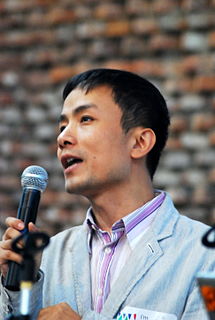 W
WJing Zhao, also known by his pen name Michael Anti, is a Chinese journalist and political blogger, recognized for his posts about freedom of the press in China. He has been described in mid-2000s as "at one time perhaps the most famous political blogger on China's Internet.".
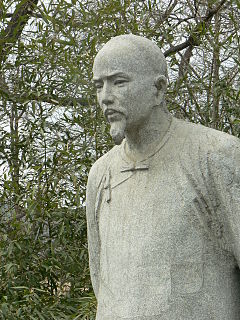 W
WCáo Xuěqín ; was a Chinese writer during the Qing dynasty. He is best known as the author of Dream of the Red Chamber, one of the Four Great Classical Novels of Chinese literature. His given name was Cáo Zhān (曹霑) and his courtesy name was Mèngruǎn.
 W
WChen Mengjia was a Chinese scholar, poet, paleographer and archaeologist. He was considered the foremost authority on oracle bones and was Professor of Chinese at Tsinghua University in Beijing.
 W
WCheng Shewo was a journalist, publisher, and educator of the Republic of China. He was the founder of Shih Hsin University in Taiwan.
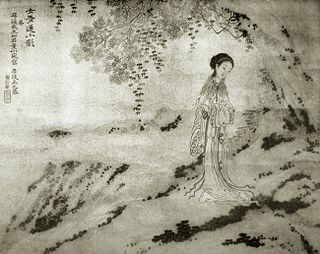 W
WDong Xiaowan (1624–1651) was a Chinese courtesan, poet and writer, also known by her pen name Qinglian.
 W
WDu Qiuniang or Lady Du Qiu (?–825?) was a Tang dynasty Chinese poet. She is the only female poet to be included in the famous anthology Three Hundred Tang Poems.
 W
WPing Fu is a Chinese-American entrepreneur. She is the co-founder of 3D software development company Geomagic, and was its chief executive officer until February 2013 when the company was acquired by 3D Systems Inc. As of March 2014, she is the Vice President and Chief Entrepreneur Officer at 3D Systems. Fu grew up in China during the Cultural Revolution and moved to the United States in 1984. She co-founded Geomagic in 1997 with her then-husband Herbert Edelsbrunner, and has been recognized for her achievements with the company through a number of awards, including being named Inc. magazine's 2005 "Entrepreneur of the Year". In 2013, she published her memoir, Bend, Not Break, co-authored with MeiMei Fox.
 W
WFu Shanxiang was a Chinese scholar from Nanjing who became Chancellor under the Taiping Heavenly Kingdom, which was nearly successful in its attempts to overthrow the Qing dynasty in the 1850s. Fu is known as the first female Zhuangyuan in Chinese history.
 W
WJizang (549–623) was a Persian-Chinese Buddhist monk and scholar who is often regarded as the founder of East Asian Mādhyamaka. He is also known as Jiaxiang or Master Jiaxiang because he acquired fame at the Jiaxiang Temple.
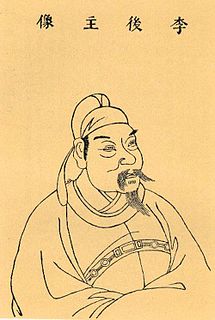 W
WLi Yu, before 961 known as Li Congjia (李從嘉), also known as Li Houzhu, was the third ruler of the Southern Tang state during imperial China's Five Dynasties and Ten Kingdoms period. He reigned from 961 until 976, when he was captured by the invading Song dynasty armies which annexed his kingdom. He died by poison on orders of Emperor Taizong of Song after 2 years essentially as an exiled prisoner.
 W
WLiu E, courtesy name Tieyun, was a Chinese writer, archaeologist and politician of the late Qing Dynasty.
 W
WLiu Zhi, or Liu Chih, was a Chinese Sunni Hanafi-Maturidi scholar of the Qing dynasty, belonging to the Huiru (Muslim) school of Neoconfucian thought. He was the most prominent of the Han Kitab writers who attempted to explain Muslim thought in the Chinese intellectual climate for a Hui Chinese audience, by frequently borrowing terminologies from Buddhism, Taoism and most prominently Neoconfucianism and aligning them with Islamic concepts. He was from the city of Nanjing. His magnum opus, T'ien-fang hsing-li or 'Nature and Principle in the Direction of Heaven', was considered the authoritative exposition of Islamic beliefs and has been republished twenty-five times between 1760 and 1939, and is constantly referred to by Muslims writing in Chinese.
 W
WMa Wan was a Chinese landscape painter, calligrapher, and poet during the Yuan Dynasty (1271–1368). His specific dates of birth and death are not known.
 W
WMao Yushi is a Chinese economist. Mao graduated from Shanghai Jiao Tong University in 1950 and was labeled a 'rightist' in 1958. In 1986 Mao was a visiting scholar at Harvard University and in 1990 Mao was a senior lecturer at Queensland University.
 W
WShen Chun-shan was a Taiwanese physicist who served as president of National Tsing Hua University from 1994 to 1997. He was known as one of the "four princes of Taiwan" along with Chen Li-an, Fredrick Chien, and Lien Chan, all of whose fathers attained prominence in politics prior to their sons' successes.
 W
WLi Shengjiao was a senior Chinese diplomat, jurist, educator, scholar, bilingual author, former Nanjing sports star and an expert on the I Ching. Being recognized as an authority on international law and U.S.-China relations, Li was known for his contribution to the International Law of the Sea and China's boundary and ocean affairs.
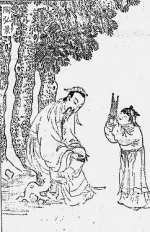 W
WTao Hongjing (456–536), courtesy name Tongming, was a Chinese polymath writer, calligrapher, waidan alchemist, pharmacologist, musician, and astronomer during the Northern and Southern dynasties (420–589). He is best known as a founder of the Shangqing "Highest Clarity" school of Daoism and the compiler-editor of the basic Shangqing religious texts.
 W
WWang Chao is a Chinese film director and screenwriter, sometimes considered part of the loosely defined "sixth generation." Wang began his career serving as an assistant director to the fifth generation auteur, Chen Kaige, working with the elder director on epics like Farewell My Concubine and The Emperor and the Assassin. At the same time, he began to write fiction including several short stories and novellas, one of which would later go on to serve sa the basis of Wang's directorial debut, The Orphan of Anyang.
 W
WWáng Dàiyú was a Chinese Hanafi-Maturidi (Hui) scholar of Arab descent. His given name was Ya, style name Daiyu. He called himself Zhenhui Laoren 真回老人 and went by his style name.
 W
WWu Jinglian is one of the preeminent economists of the People's Republic of China (PRC), primarily specializing in economic policy as it applies to China's ongoing series of economic reforms.
 W
WWu Liangyong is a Chinese architect and urban planner. He was a former professor in urban planning, architecture and design. In preparation to the 2008 Summer Olympics in Beijing, he was leading the team that studied the buildings of the games. He is considered the most influential architect and urban planner in China.
 W
WYu Kwang-chung, also Romanised as Yu Guangzhong was a Taiwanese writer, poet, educator and critic.
 W
WZhu Dexi was a Chinese linguist, grammarian, and educator. He was vice-president of Peking University and made significant contributions to Modern Chinese and Teaching Chinese as a Foreign Language.
 W
WZhu Quan, Prince of Ning was the 17th son of Ming Hongwu Emperor. During his life, he served as a military commander, feudal lord, historian, and playwright. He is also remembered as a great tea connoisseur, a zither player, and composer.
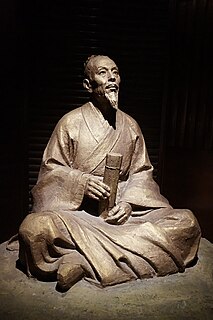 W
WZu Chongzhi, courtesy name Wenyuan, was a Chinese astronomer, mathematician, politician, inventor, and writer during the Liu Song and Southern Qi dynasties. He was most notable for calculating pi as between 3.1415926 and 3.1415927, a record which would not be surpassed for 800 years.